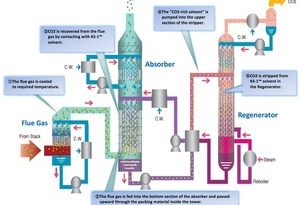Biden sets goal to cut US GHG emissions in half by 2030
Energy Disrupter
ADVERTISEMENT
President Biden marked Earth Day on April 22 by announcing a new target for the U.S. to achieve a 50-52 percent reduction in economy-wide net greenhouse gas (GHG) pollution by 2030 when compared to a 2005 baseline. Biden made the announcement during the Leaders Summit on Climate, where Biden also fulfilled his promise to rejoin the Paris Agreement.
In his announcement, Biden stressed the link between climate and jobs. “Within our climate response lies an extraordinary engine of job creation and economic opportunity ready to be fired up,” he said. “That’s why I’ve proposed a huge investment in American infrastructure and American innovation to tap the economic opportunity that climate change presents our workers and our communities, especially those too often that have — left out and left behind…I see an opportunity to create millions of good-paying, middle-class, union jobs.”
A fact sheet released by the White House explains that each policy considered for reducing emissions is also an opportunity to support jobs and improve equity. One such policy would aim to reduce carbon pollution from the transportation sector, in part by spurring research, development, demonstration and deployment of efforts that drive forward very low carbon new-generation renewable fuels for applications like aviation.
Other policies addressed in the fact sheet include setting a goal to reach 100 percent carbon pollution-free electricity by 2035; efforts to support efficiency upgrades and electrification in buildings that would cut emissions and energy costs for families; programs aimed at reducing emissions from forests and agriculture and enhancing carbon sinks; the use of carbon capture and hydrogen to address carbon pollution from industrial processes; initiatives to reduce non-CO2 greenhouse gases; and investments in innovation to improve and broaden the set of solutions as a critical complement to deploying the affordable, reliable, and resilient clean technologies and infrastructure available today.
The Renewable Fuels Association applauded the inclusion of renewable fuels in Biden’s climate plan, but said biofuels can play a much larger role in reducing emissions. “We are pleased to see the inclusion of renewable fuels in President Biden’s plan for reducing U.S. greenhouse gas emissions, and we agree that efforts to deploy larger volumes of ‘very low carbon’ renewable fuels should be a key component of our nation’s commitment to reduce emissions from the transportation sector under the Paris Agreement,” said Geoff Cooper, president and CEO of the RFA. “However, renewable fuels can do far more than decarbonize aviation and other off-road markets. Just since 2008, nearly 1 billion metric tons of GHG emissions have been prevented from entering the atmosphere due to the increased use of renewable fuels to meet Renewable Fuel Standard obligations. In addition, recent research by scientists affiliated with Harvard, Tufts, and MIT shows that today’s average corn ethanol is reducing GHG emissions by almost 50 percent compared to gasoline. And with the adoption of carbon capture and sequestration, carbon-efficient feedstock production practices, and other new technologies, corn ethanol can be a ‘net-zero,’ carbon-neutral fuel by the end of the decade.
“As recognized by President Biden, achieving a 50 percent GHG reduction economy-wide by 2030 will take a portfolio approach that capitalizes on a broad and diverse array of low-carbon technologies, and that should include ethanol and other biofuels,” Cooper continued. “We look forward to receiving more details and information regarding the role renewable fuels are expected to play in the Biden administration’s nationally determined contribution that will be submitted to the United Nations Framework Convention on Climate Change.”
Likewise, the American Coalition for Ethanol stressed the role corn ethanol can play in reducing transportation emissions. “Renewable fuels like ethanol are a significant part of the solution to climate change and should be part of U.S. commitments to contribute to global emissions reductions under the Paris Agreement,” said Brian Jennings, CEO of ACE. “The mention of renewable fuels is welcome in President Biden’s plan to reduce GHGs. Today’s corn ethanol is next generation or advanced biofuel based on its ability to reduce GHGs by 50 percent compared to gasoline. In fact, ethanol is the only transportation energy source that can reach net-negative carbon intensity through carbon capture and sequestration and continued advancements within ethanol facilities and on-farm practices in how biofuel crops are grown. Other countries have initiated national ethanol policies as part of their countries’ global initiatives to decarbonize transportation fuels, and U.S. biofuel producers are ready to play a larger role in meeting these targets here and around the world.”
Growth Energy also emphasized the GHG reductions that can be achieved through the use of biofuels. “Growth Energy applauds President Biden for setting an ambitious new decarbonization target for the United States as part of its commitment to the Paris Agreement,” said Emily Skor, CEO of Growth Energy. “We look forward to working with the Biden-Harris Administration to ensure low-carbon biofuels, like ethanol, are an integral part of efforts to address climate change, reduce transportation sector emissions, improve air quality, and create jobs in rural America.
“Plant-based biofuels, like ethanol, have long been a key part of the nation’s strategy to reduce carbon emissions,” Skor continued. “Since 2007, ethanol has been responsible for cumulative carbon dioxide savings of 600 million metric tons in the U.S., or the equivalent of removing 130 million cars from the road, roughly half of our nation’s fleet. In addition, the biofuels industry employs more than 360,000 hard-working Americans across the country and especially in rural America. As the U.S. takes steps to address the growing climate crisis, meet our international climate goals, improve public health outcomes, and grow the clean energy economy, biofuels are an essential part of the solution.”
















